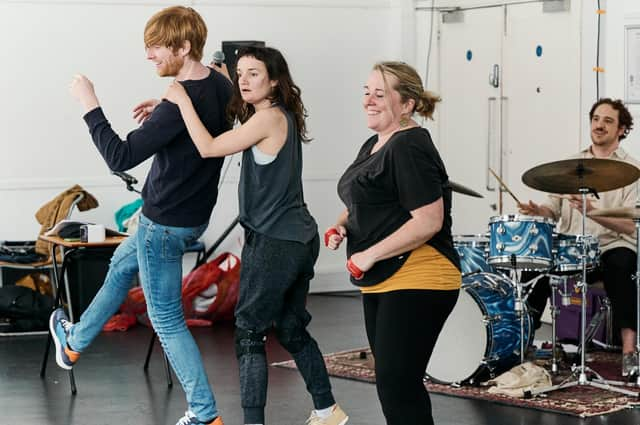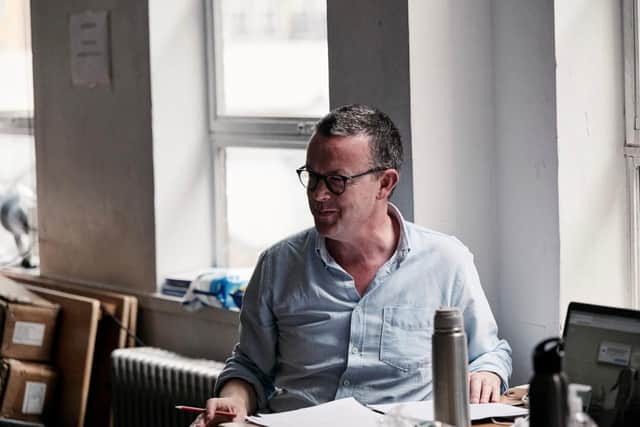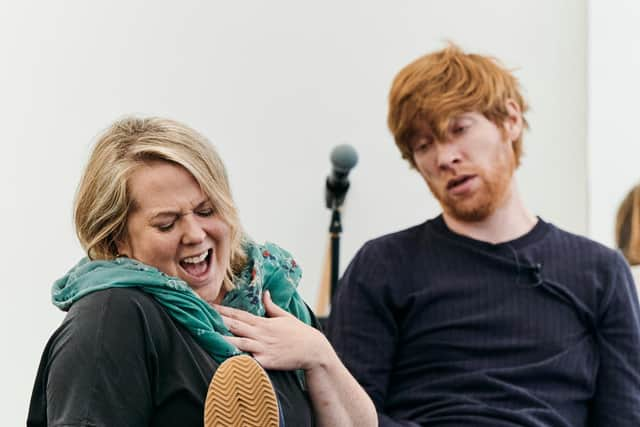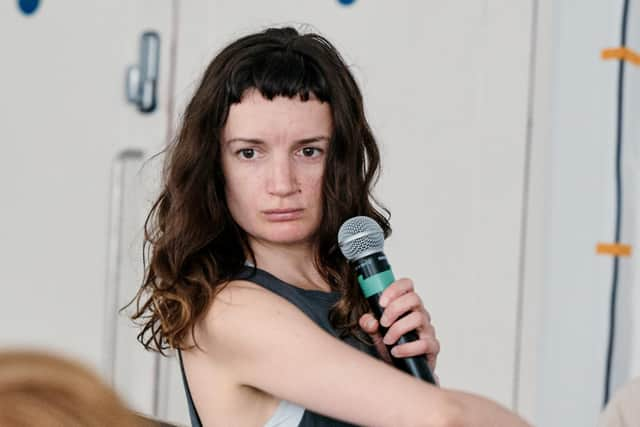Enda Walsh on premiering his new play Medicine at the EIF


When I moved into my Edinburgh flat, in the autumn of 1980, I found under the old linoleum on the kitchen floor a copy of the Edinburgh Evening News for the day I was born, 29 August 1952. Like most newspapers of the time, it had classified advertisements on its front page; and among them were the notices for that week’s events in the 1952 Edinburgh International Festival, then in full swing. Sadler’s Wells Ballet was appearing at the old Empire Theatre – now the Festival Theatre – in Coppelia and Pineapple Poll; and the King’s Theatre was playing host to the Hamburg State Opera, presenting a season of shows accompanied by the Hamburg Philharmonic Orchestra.
It was a thrilling discovery for a young arts writer, linking the time of my birth to the early years of the festival that – for me, as for many Scottish arts journalists – provided the gateway to, and the cornerstone of, my fledgling career as a critic and writer about a Scottish arts scene that was becoming ever more globally connected and confident, as Edinburgh began to reap the full benefits of its role as the world’s first postwar festival city, and other cities began to follow suit.
Advertisement
Hide AdBeyond that personal link with the Festival, though, that old Evening News also made me intensely aware of the relationship between the Edinburgh International Festival, and the postwar world in which I had grown up; a time, for my family and for many millions across the world, of immense healing and reconstruction, and of unprecedented efforts, particularly in Europe, to make sure that the evils of the past – not only war itself, but the poverty and economic insecurity that fed the forces of political extremism – would never tear our world apart again. In that still-austere postwar world of 1952, with rationing still in force, and anti-German feeling still rife across the UK, it must have felt like a significant gesture of reconciliation to bring a German opera company and orchestra to Edinburgh, and to host them alongside Sadler’s Wells and the New York City Ballet; a statement of intent about the future of peace and co-operation for which people yearned, in the postwar years, and of willingness, in the world of the arts, to build the practical connections and relationships that would begin to make those dreams a reality.


And now, 74 years on – and after an unprecedented break in its previously uninterrupted history, with no live festival events at all in 2020 – the Edinburgh International Festival finds itself once again facing a world in crisis, and seeking ways of becoming a force for understanding, healing and hope in a world shaken both by the trauma of the Covid pandemic, and by the ever-increasing challenge of climate change. At a time when international understanding and co-operation has never been more necessary, international arts organisations must find new ways of building global links without the massive carbon footprint involved in traditional forms of travel and touring; and of bringing people together again, in a world where the very act of gathering has become fraught with danger. If Edinburgh is to remain the world’s greatest festival city, the Edinburgh International Festival must once again play a leading role in responding to those challenges; and the 2021 festival programme, staged mainly in outdoor covered venues, will strive to meet them in a huge range of ways, from a music programme that reflects some exciting new beginnings in the world of classical music, to a theatre and spoken word programme that grapples powerfully with many of the issues raised, during the pandemic year, by the Black Lives Matter movement, and the debate around it.
At the centre of that theatre programme, though, sits a play simply called Medicine, by the acclaimed Irish playwright Enda Walsh; and although it was not Walsh’s intention to write a piece about post-pandemic crisis and healing, he now finds himself preparing for the Edinburgh world premier of a play deeply linked to the concerns about identity and mental health that, for many, have been a profound part of the experience of the last year.
“I began to write this play long before the pandemic,” says Walsh, “but now I can see how closely it reflects some of the concerns that have emerged over the last 17 months – the themes of isolation, of people feeling lost and disorientated, the impact on mental health. Sometimes, as a playwright, you really don’t know what you’re writing until it’s done, and you see it in rehearsal. That happened with this play – we had a workshop week a few months ago, and I suddenly began to understand the shape of the play, the swagger of it.”
Co-produced by Landmark Productions and the Galway International Arts Festival, both long-term supporters of Enda Walsh’s work, Medicine is a play which Walsh describes as very personal, based partly on recent revelations about conditions in Irish mental institutions during the mid-20th century, but also on Walsh’s own experience of his mother’s struggle with Alzheimer’s disease, in the years before her death. Walsh was born in north Dublin in 1967, the fourth child in a big, dramatic family of five siblings (plus parents) in which he often took the role of observer, noting events from under the kitchen table. His mother had been an actress before her marriage, and his father ran a furniture store, with very mixed success; and his upbringing seems to have left Walsh with a habit of using theatre, and drama more generally, as a way of exploring and checking on his own identity, and the identity of others.


“I do think theatre is an art-form that allows you to check in on who you are, why you are the way you are, and what you’ve become,” says Walsh, “and that’s why I was drawn to the idea of this fictional character, John Kane, who is sitting on the edge of a hospital trolley, wondering how he ended up there, and feeling very uncertain and confused about his own memory and identity. Then these two women called Mary come along, both musical comedy actresses; and it’s apparently their job to tell the story of John’s life, complete with songs – except that of course, they begin to edit it to suit themselves, and the demands of the show.
Advertisement
Hide Ad“I’m also very interested in stories of people who, like John, have been ignored or unloved in their lives, and who struggle to know who they are in that way. I always feel on the precipice of that experience; I’m very conscious that every one of us is only an accident or an incident away from our lives falling apart. So the play is about John’s story, and the theatrical manipulation of that story, and about how unreliable memory can be. I think it’s cruel, and funny; and yes, it’s also a bit of a musical.”
In Enda Walsh’s own production of the play, the role of John will be played by leading Irish stage and film actor Domhnall Gleeson, perhaps best knows as General Hux in the Star Wars sequel trilogy, with Clare Barrett and Aoife Duffin as the two Marys; and Walsh – whose work first exploded onto the international stage with the roaring Fringe success of his early play Disco Pigs at the Traverse in 1997, and who made his Edinburgh International Festival debut in 2015, when he wrote the libretto for Donnacha Dennehy’s opera The Last Hotel – is more than delighted that the play will premier in Edinburgh, in this most unusual year.
Advertisement
Hide Ad“I know the pandemic has raised all sorts of question for international cultural events,” says Walsh, “and that there will be change. But for me, I just can’t imagine where I would have been, without this Festival and Fringe. When we arrived in Edinburgh in 1997, we didn’t even know who we were. We had to see our work in that international arena, alongside this huge festival of other work, before we could begin to see what our work was, and what it might have to say in the world. It’s one of those events where we have the chance to get together and check out our humanity, and see who we are and how we are, on a global scale.”


Medicine is at the Traverse Theatre, Edinburgh, from 7-29 August, with previews from 4-6 August, www.eif.co.uk
A message from the Editor:
Thank you for reading this article. We're more reliant on your support than ever as the shift in consumer habits brought about by coronavirus impacts our advertisers.
If you haven't already, please consider supporting our trusted, fact-checked journalism by taking out a digital subscription at https://www.scotsman.com/subscriptions